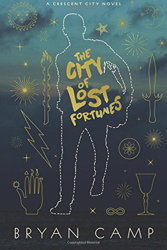
This week’s EATING AUTHORS guest lives in one of my favorite cities, New Orleans, and for that alone I would have him here. But better still, Bryan Camp writes about New Orleans. In fact, he started writing his first novel, The City of Lost Fortunes, in the backseat of the family car as they evacuated for Hurricane Katrina. That book was released in mid-April, and it promises to be only the first volume of his Crescent City series.
Bryan’s has an MFA from the University of New Orleans and is also an alumnus of Clarion West.
And if you’re fortunate enough to be in the greater Baltimore area, you can catch him at the Charm City Spec reading series on July 28th.

LMS: Welcome, Bryan. You live in the city that’s given me some of the best meals of my life. What stands out for you?
BC: Being from New Orleans, I’ve had many memorable meals, at family dinner tables, in fancy, famous restaurants, in greasy spoon diners at 3 in the morning. Surprisingly, though, my most memorable meal was eaten in a little town named San Miguel de Allende, in the mountains of central Mexico.
While I was working towards an MFA at the University of New Orleans, I was also a full time teacher in LaPlace, about an hour’s commute from New Orleans. This drive (plus lesson plans and grading and writing IEP’s) made getting to evening classes on campus more than a little challenging. Fortunately for me, UNO offered a Low-Residency option, where the majority of my coursework would be offered online, and month-long, intensive semesters abroad fulfilling the in-residency requirement of the degree.
So that’s how I ended up spending a month or so of each summer for two years in Mexico. It also made me something of an aberration within the program: I didn’t know any of the New Orleans students, even though I lived there, and I was the only member of my online classes who lived in the same place as our instructors. My first semester there was a bewildering, anxious time. I was homesick and for-real-don’t-drink-the-water-I-thought-I-was-dying sick, struggling to work and struggling to acclimate and struggling to breathe in the mountains when I’m from a city that’s nestled comfortably below sea-level. My second semester was much better. For one, I was at the end of my program instead of the beginning, so I knew everyone, teachers and fellow students alike. For another, I was much, much more careful about the water. And, probably most importantly, I had family with me: my wife, Beth Anne, came for the whole month, and my dad, grandmother, and little brother came and stayed with us for the third week.
That summer I was taking a science fiction/fantasy writing course with the brilliant Jim Grimsley, and a New Orleans Literature class with Dr. Nancy Dixon, who has literally written the book on NOLA Lit, so the month was basically a microcosm of my ideal writing career. A week or so into class, Nancy announced that since we were all Low-Residency students, she wanted to make us a real New Orleans meal at the end of the semester, if she could find the ingredients. I raised my hand and, a little sheepishly, said, “I think we can help with that.â€
My wife is a true New Orleanean, you see. Faced with the prospect of an entire month away from everything familiar to her, she’d packed an entire suitcase full of ingredients. I’m not talking about a couple of bottles of Tabasco and a package of chicory coffee. I’m talking boxes of Zatarains. Spices, seasoning, a couple of bags of red beans. Y’all, my wife, god bless her, brought beans to Mexico. I teased her about it, but as in all things, she was right and I was wrong.
There are things you can’t pack, though. Things that are integral to New Orleans cuisine, like bay leaves and okra. (Beth Anne and Nanc bonded over a long conversation about whether you could even call it gumbo if it didn’t have okra in it) Even though she didn’t speak much Spanish, Beth Anne scoured the open air markets and sniffed every dried herb in the little shop across from where we had classes until she found everything she needed. (Fun fact, there’s no translation for bay leaves because to the rest of the world they’re known as laurel leaves.)
I really don’t know what all else she went through to make it happen, but thanks to Beth Anne, the last day of class we met up at Nancy’s rented house so the class could get a taste of New Orleans. We brought a pan of stuffed bell peppers: cored, filled with dirty rice—rice cooked with ground beef and chicken gizzards—and then baked, a pot of chicken and sausage jambalaya: so aromatic that you could smell us down the block, so spicy that you needed at least one cerveza per bowl, and a jug of my dad’s sangria, which didn’t really have any connection to New Orleans, but was too damned good to leave at home. Nancy cooked red beans and rice, because how could you not, a gumbo with a roux as rich and as dark as chocolate (she even had potato salad to add to the bowl, which you won’t see anywhere outside the city, and a bread pudding with a rum sauce at least as potent as the sangria we brought. It was a feast. It was a celebration.
And for me, it was a little bit like being home.

Thanks, Bryan. Clearly, you are a holy man, bringing your cuisine to the less fortunate (i.e., everyone who is anywhere else). Do feel free to send me some too.
Next Monday: Another author and another meal!
Want to never miss an installment of EATING AUTHORS?
Click this link and sign up for a weekly email to bring you here as soon as they post.
#SFWApro
Tags: Eating Authors

